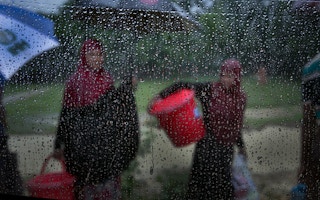Much like the fast-flowing waters of the Padma River, the climate crisis is fluid, fast moving, and often unpredictable. The same cannot be said for talks to tackle the crisis itself. At COP28 right now, we unfortunately see the predictable differences emerging over issues such as mitigation, finance and adaptation.
In the coming days it is essential we make progress in these crucial areas. We must keep the 1.5°C warming limit alive, the Global Stocktake must deliver increased ambition, and finance needs to be mobilised urgently recognising the increasing needs of vulnerable countries such as ours.
In Dubai today we even see some countries continuing to challenge the science. In Bangladesh we have experienced the impact of rising emissions for decades. There is no doubt. This year alone, temperatures in our country soared above 40 degrees. Our people endured punishing heat waves and power cuts; thousands of schools were shut. In August, 55 people were killed in flooding and thousands uprooted from their homes.
Bangladesh is responsible for 0.47 per cent of global emissions - yet we are ranked the seventh most vulnerable country to climate change. For years we have been investing in ways to grow our economy whilst adapting to the seismic effects of climate change.
Through the Mujib Climate Prosperity Plan, we have set out ways to transform our society and set out a path of climate resilience not climate vulnerability. Our energy transition involves boosting renewable energy capacity to 30 per cent by 2030, developing sustainable agriculture and modernising grids.
“
As the waters rise around our feet, as heat waves continue to break records, we are forced to remember that the biggest challenges we face remain on the horizon. We must effectively confront and address them together on a war footing.
Today we continue to build flood defences, sea walls and mangrove forests. Satellite warning systems track dangerous weather patterns. All these measures help us save lives. Climate disaster mitigation is woven into the very DNA of every action taken by my government as part of the national adaptation plan. It is integral to our economy and survival.
But adaptation is also about how we grow our interconnected economies, our different sectors from food to textiles, which sector communities rely on, and how we build infrastructure. Our bold strategy needs even bolder investment. Solar technology must be made more affordable, prohibitive taxes on inverters must be reconsidered, and international investment must be forthcoming.
Huge finance gap
Leaders at COP28 have pledged US$169 million towards the Adaptation Fund, this is far from the US$300 million annual target for this year. The financing gap is at a staggering US$194–366 billion per year. This falls hugely short of where we need to be. Rich countries must step up.
There are mere days and hours left to reach an ambitious outcome that the world urgently needs. Parties know what they need to achieve at and beyond COP28. The largest carbon-emitting nations must submit ambitious NDCs and set out bold strategies to meet them. The developed countries must deliver the US$100bn per year and the new post-2025 climate finance goals must be significantly higher than current commitments.
It is vital that climate finance meets three essential criteria: funding must be adequate, routine, and accessible. Countries such as ours face years of difficulty ahead - future funding must reach those who need it most when it most counts.
We require a vision for the future. At COP28, I beseech my international partners to reflect deeply on our common goals, to take decisive action and acknowledge the true costs of any further delays. I applaud the hard work being done and sincere efforts undertaken by all. But equally, I urge my international partners to act in solidarity as the latest available science unequivocally demands.
As the waters rise around our feet, as heat waves continue to break records, we are forced to remember that the biggest challenges we face remain on the horizon. We must effectively confront and address them together on a war footing.
This story was published with permission from Thomson Reuters Foundation, the charitable arm of Thomson Reuters, that covers humanitarian news, climate change, resilience, women’s rights, trafficking and property rights. Visit https://www.context.news/.


















